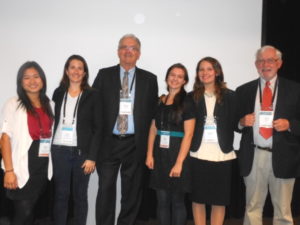

2014 Young Scholar: Jade Chan

Jade Chan
University of Queensland
Sponsored by the Queensland Committee
Jade is in her second year of a Bachelor of Agricultural Science at the University of Queensland. She planning to major in animal production. It was her interest in the role of agriculture in developing countries to improve the quality of living that prompted her to apply for the Crawford Fund Travel Scholarship.
Conference Report
The opportunity to converse, and for numerous people to share their passion for the developing world and international agriculture, was enjoyable and continued in each “interactive” session of the experience.”
We are born into a world where food is acknowledged as an unlimited resource. Countless items are placed upon a shelf, valued and are always in constant supply. It has become the norm for a number of people living in the developed world and is not often given a second thought. So if food is such an unlimited resource, why are our parents always nagging us to stop wasting it?
Our parents were raised where technology wasn’t as progressed which meant fewer methods of food preservation and storage which consequently meant there was a global food issue. Sadly, a generation later this problem still persists in under developed countries. The developed world has built up a façade that there is enough food to feed the current population, although not enough information has been provided about the processes that food undergoes to travel from paddock to plate. The world is estimated to reach a population of 9 billion by the year 2050 which means another two billion mouths to feed and in which we should consider the constraints the world has to overcome to feed the growing population.
Attending the Crawford Fund conference as a scholar presented a number of opportunities and opinions I would not have been exposed to as an undergraduate. The annual parliamentary conference focused on improving the issues presented to the world with the oncoming population growth. I applied for this scholarship hoping to broaden my perspective and knowledge I would require for my future career. International agriculture has a broad range of research and job prospectives and a number of them were represented by numerous companies and organisations at the networking dinner, conference and scholars day.
The networking dinner allowed for the interaction between the companies and researchers at a more personal level and it was interesting to hear from a number of different points of view from a large range of agricultural backgrounds who were all interested in improving the food security for years to come. The opportunity to converse, and for numerous people to share their passion for the developing world and international agriculture, was enjoyable and continued in each “interactive” session of the experience.
The topics presented at this year’s annual conference aimed to address the food security issues we are now facing. The conference brought up a number of issues presented to the world with the oncoming population growth. There were a number of speakers discussing particular problems in specific countries and how they’ve concluded to solve them. The large range of speakers from numerous places around the world really emphasised how this is an issue that is presented to the world and how it will take a collective effort to overcome it.
The scholar’s day was directed to the young agricultural scientists with talks and presentations from a few of the scholars and researchers. This session was immensely informative as a number of the speakers were in my ideal field of work and it allowed for a Q&A session to grasp an idea of which pathway to work towards. One of the speakers was Dr Catherine Bertini who has a vast experience in the international agricultural scheme and shared her pathway towards her part in the UN World food program.